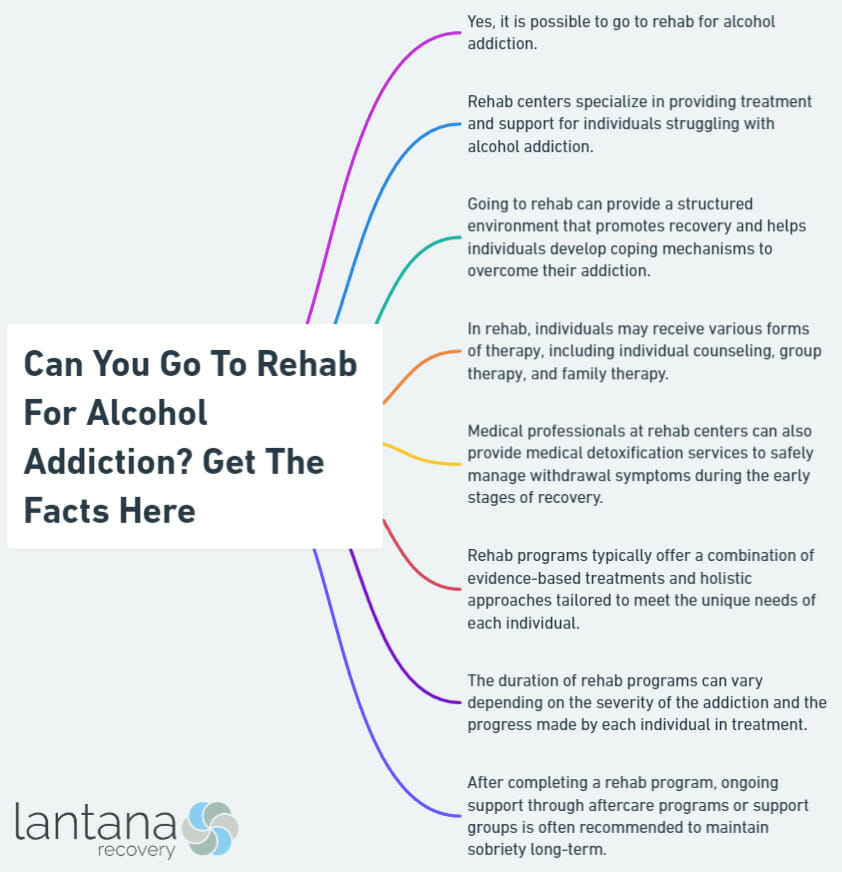Are you or a loved one struggling with alcohol addiction and wondering, “can you go to rehab for alcohol?” Understanding the ins and outs of alcohol rehab can be overwhelming, but it’s crucial to make an informed decision. In this comprehensive guide, we’ll explore the various aspects of alcohol rehab and help you determine if it’s the right path for you or your loved one. Let’s embark on this journey to recovery together.
Short Summary
- Alcohol rehab is a positive and life-changing decision to treat Alcohol Use Disorder (AUD)
- Choose the right alcohol rehab facility for tailored treatment plans, accreditation & quality standards
- Explore cost savings with insurance coverage to get the help you need
Understanding Alcohol Rehab: Is It for You?

Alcohol rehab is a life-changing decision, tailored to each individual’s needs, often taking place at an addiction treatment center. Alcoholism, including alcohol abuse, can have a negative impact on multiple aspects of a person’s life, such as straining relationships with family, missing work frequently, and having difficulty meeting family or work commitments.
With an array of treatment options available for alcohol addiction, it’s crucial to determine if alcohol rehab is suitable for you or your loved ones. Treating alcohol use disorder (AUD) is essential for one’s health and well-being and the start of the recovery process.
What is Alcohol Use Disorder (AUD)?
According to the 2018 study by Henry R. Kranzler, M.D. and Michael Sokya, M.D. in Diagnosis and Pharmacotherapy of Alcohol Use Disorder, high alcohol consumption is linked to a significant rate of morbidity and mortality, with heavy alcohol use being the primary risk factor for Alcohol Use Disorder (AUD). AUD is a spectrum of alcohol-related issues, ranging from substance abuse to dependence and even addiction. Recognizing and addressing these issues is essential to improving your health. Drinking regularly and/or heavily and experiencing alcohol withdrawal symptoms when trying to stop or reduce alcohol use are signs of an alcohol problem. Withdrawal symptoms may appear several hours to a few days after stopping or reducing alcohol consumption, and it’s recommended to seek help from the mental health services administration or other professional services to manage these symptoms.
Alarmingly, almost a quarter of the adult population in the United States meets the criteria for an alcohol use disorder (AUD). If you recognize any of the warning signs in your behavior, it may be beneficial to seek professional help, such as inpatient or residential treatment.
Who Can Benefit from Alcohol Rehab?
Individuals who have an AUD and anyone striving to overcome alcohol addiction can reap the rewards of alcohol rehab, including medication-assisted treatment. Alcohol rehab provides a supportive environment for detox, equips individuals with the resources to achieve recovery, and offers guidance for long-term sobriety success, all of which are essential components of the recovery process.
So, whether you’re battling with binge drinking or alcohol dependence, alcohol rehab can be a life-changing experience to help you regain control over your life.
Types of Alcohol Rehab Programs

In your journey to recovery, it’s essential to understand the different types of alcohol rehab programs available to you, such as inpatient/residential treatment, outpatient treatment, and specialized programs. Each program offers unique advantages and caters to different individual needs.
Inpatient/residential treatment provides a comprehensive approach to alcohol addiction treatment, with the opportunity to live at a treatment facility for a period of time and gain the necessary skills and support to overcome addiction. On the other hand, outpatient treatment is an effective type of alcohol addiction treatment that involves attending treatment sessions at a facility on a regular basis but not living at the facility.
Specialized programs are designed to provide tailored support for individuals with specific types of alcohol addiction, such as those with co-occurring mental health disorders, thus helping you achieve success and reach your recovery goals.
Inpatient/Residential Treatment
Inpatient rehab is the most comprehensive and structured treatment environment for those determined to overcome alcoholism. These programs are tailored for treating the most severe forms of alcoholism and require individuals to stay on-site for the duration of the program – 30, 60, or 90 days – to maximize their chances of success. In inpatient rehab facilities, comprehensive, round-the-clock care is provided by experienced treatment professionals. Inpatient treatment seeks to provide a secure setting where you can acquire the essential skills and tools needed for beating addiction. These resources will help you on your road to recovery.
The initial phase in inpatient rehab is alcohol detox, which aims to safeguard your health and prevent any serious medical issues from arising. Inpatient rehab provides many resources for addiction recovery. Such as support groups, individual or group therapy and co-occurring mental health treatment. It also helps set a solid foundation for long-term recovery.
Outpatient Treatment
Outpatient treatment is an empowering type of treatment program that allows individuals to maintain their daily lives while seeking treatment. This type of treatment offers more freedom and fewer restrictions than inpatient treatment, allowing patients to maintain their daily commitments like work or school while still receiving rehab.
Partial hospitalization treatment is another option, providing an ideal setting to build a foundation for a successful journey to sobriety in a safe and encouraging atmosphere. Outpatient care in alcohol rehab offers individuals the opportunity to continue living their lives while receiving the treatment they need to get back on track.
Specialized Programs
Specialized programs are designed to meet the unique needs and interests of different groups of people in alcohol rehab. For example, some programs focus on co-occurring mental health disorders, while others cater to specific populations, such as veterans or LGBTQ+ individuals. Also, those wondering if you can use the Family and Medical Leave Act (FMLA) for alcohol rehab can benefit from expert treatment.
These tailored programs can help you achieve success and reach your recovery goals by addressing your specific needs and challenges.
The Alcohol Rehab Process: What to Expect

The typical alcohol treatment process includes inpatient detox, followed by residential treatment, and then outpatient care to help you get on the path to sobriety. The first step in conquering alcoholism is detoxification. It is highly recommended to complete alcohol detox under professional medical care to safeguard your health and prevent any serious medical issues from arising. During detox, treatment professionals can provide medication to ease your discomfort so you can focus on your recovery journey.
After detox, you can enter residential treatment to gain insight into the disease of addiction and equip yourself with the essential skills to maintain sobriety in the long term. From there, you can transition to outpatient care, where you’ll attend therapy appointments and work on your recovery in the real world. This comprehensive and step-by-step approach to alcohol rehab ensures that you are well-supported throughout your recovery journey.
Assessment and Personalized Treatment Planning
The initial assessment process is an important step in understanding your drinking behavior, alcohol-related problems, mental health status, and any co-occurring disorders. Whether you’re going to alcohol rehab for professionals or are battling relapse, there’s a program for you.
A personalized treatment plan is carefully crafted by a treatment provider to target the issues identified in the initial assessment to ensure the most successful and individualized approach to recovery.
Detoxification and Withdrawal Management
During the detoxification stage, you may experience both minor and more serious withdrawal symptoms. Medications such as Benzodiazepines can be given to provide relief from some of the pain during the detoxification stage and reduce the severity of withdrawal symptoms. Benzodiazepines are chemically similar to alcohol in how they interact within the brain, providing an effective and safe way to regulate the healing process when detoxing from alcohol. The use of Benzodiazepines can provide enhanced relaxation and sedation while protecting against potentially hazardous medical conditions such as seizures.
Group therapy can also provide a distraction from withdrawal symptoms and foster a sense of community that can help promote lasting sobriety. The goal of alcohol detox in inpatient care is to safeguard your health and prevent any serious medical issues from arising.
Therapy and Counseling
Therapy and counseling can help you identify and address problematic behaviors, beliefs, and emotions during alcohol rehab. Through conversation with a trained mental health professional, you can gain insight into your issues and learn new strategies for managing them. Counseling is also great for addressing specific issues, such as addiction or stress management, in a limited amount of time.
Alcohol counseling provides a valuable opportunity for individuals to express themselves and gain valuable insight during their recovery journey. An alcohol counselor can help you discover and tackle any issues that could be fueling your drinking problem. These issues could be related to relationships, such as with peers, family or work, or other circumstances.
Mental Health Support in Alcohol Rehab

Mental health is a crucial factor in alcohol addiction treatment, as many people with addiction also have an underlying mental health issue. Mental health issues can be addressed as co-occurring issues during rehab for alcohol, where mental health clinicians can provide support during rehab. You could have the opportunity to meet with a therapist or a psychiatrist during your treatment program.
Naltrexone is an effective medication that helps reduce the pleasurable effects of alcohol by binding with endorphin receptors in the brain. Studies have found that “naltrexone may be a safe and effective adjunct to treatment in alcohol-dependent individuals, particularly in preventing alcohol relapse” (Naltrexone in the Treatment of Alcohol Dependence, Volpicelli et al., 1992.)
Dual Diagnosis Treatment
Dual diagnosis treatment is an incredibly effective approach to treating both a mental health disorder and a substance use disorder at the same time. By addressing both the addiction and the underlying mental health issues, individuals can experience a more comprehensive and sustainable recovery through substance abuse treatment.
Dual diagnosis treatment typically involves a combination of individual and group therapy, medication management, and lifestyle changes. With the right support, individuals can develop the skills and strategies needed to effectively manage their dual diagnosis.
Integrating Mental Health Services
Integrating mental health services into alcohol rehab programs is essential for providing comprehensive care that addresses both physical and mental health needs. This can help individuals better manage their addiction and ultimately achieve long-term recovery.
Integrating mental health services offers numerous benefits, including the delivery of comprehensive care that addresses both physical and mental health needs, improved access to care, better coordination of care, and improved outcomes.
Cost and Insurance Coverage for Alcohol Rehab

The cost of alcohol rehab can be a concern for many individuals seeking treatment. Insurance can be very helpful in covering the cost of rehab. In fact, many insurance plans cover almost all the expenses. Many local and state programs are available to support people who lack insurance. These opportunities can help you get the assistance you need.
To determine your coverage, it’s important to check your specific policy, the rehab center you choose, the treatments you are receiving, and other factors.
Factors Affecting Cost

The cost of alcohol rehab can vary depending on factors such as program type, duration, and location. Inpatient programs typically last 30-90 days, while outpatient programs can last anywhere from a few weeks to several months to help you reach your goals.
Alcohol rehab treatment facilities, like Lantana Recovery in Charleston, are available in a range of locations, from hospitals to residential treatment centers and outpatient clinics, giving you plenty of options to choose from.
Insurance Coverage
Insurance coverage for alcohol rehab can vary depending on individual insurance plans and benefits. The cost of treatment and out-of-pocket expenses can be worth exploring to help you get the care you need. Checking with your insurance provider is the best way to get a clear understanding of what substance use treatment is covered under your plan.
Choosing the Right Alcohol Rehab Facility

Selecting the right alcohol rehab facility is essential to ensure you make an informed and wise decision. High-quality treatment programs can offer the highest quality of care possible. They receive accreditation from the Joint Commission or other certifying agencies. Facilities that demonstrate an accreditation designation have the necessary qualified addiction specialists and support staff to provide you with the highest quality care.
It is important to research the facility and ask questions to ensure that the program is the right fit.
Accreditation and Quality Standards
Accreditation is a crucial process that alcohol rehab facilities undergo to guarantee that they meet top-notch standards for addiction treatment. CARF (Commission on Accreditation of Rehabilitation Facilities) and the Joint Commission are highly respected third-party organizations that can help facilities gain accreditation. These organizations conduct surveys and assessments to ensure that the rehab center meets the necessary criteria for providing effective and safe treatment for alcohol addiction, thus motivating individuals to work toward their recovery.
Accreditation is an important step for rehab facilities to take in order to ensure that they are providing quality rehabilitation services.
Personalized Approach to Recovery
Jaap va der Stel, PhD explains in Precision in Addiction Care that personalized or individualized medicine is gaining popularity. A personalized approach to alcohol addiction treatment can make a huge difference, as it considers the unique needs, preferences, and circumstances of each person. This approach ensures that the treatment plan is tailored to the individual, thus increasing the chances of successful outcomes.
By utilizing clinical treatment, medications, faith-based approaches, and other personalized interventions, individuals can work towards recovering from both their addiction and any co-occurring mental health disorders.

Summary
In conclusion, alcohol rehab is a comprehensive and life-changing solution for those struggling with alcohol addiction. With various treatment options, an emphasis on mental health support, and insurance coverage options, alcohol rehab offers a personalized and effective path to recovery. By understanding the various aspects of alcohol rehab and choosing the right facility for your unique needs, you can embark on a journey towards a healthier, happier, and sober life. Remember, recovery is possible, and your journey starts today.
Frequently Asked Questions
What is the first line of treatment for alcoholism?
Naltrexone should be used as the first line of treatment for alcoholism, due to its preferable dosing schedule and effectiveness in reducing relapse rates.
Naltrexone is the preferred choice, allowing individuals to start treatment while still drinking.
What can you do for a recovering alcoholic?
Help create a safe and supportive environment for a recovering alcoholic by making changes to support their sobriety. Encourage healthy activities, such as exercise, yoga, or meditation. Make sure they have access to needed support systems, such as Alcoholics Anonymous or counseling. Lastly, be an understanding presence in their life. Offer your support and understanding, and be there to listen when they need it.
What is the recovery rate for alcoholics?
Up to 36% of people suffering from alcoholism can recover within one year, with approximately 18% achieving low-risk drinking and 18% abstaining completely.
What is the difference between inpatient and outpatient alcohol rehab?
Inpatient alcohol rehab involves a structured environment with individuals staying on-site, while outpatient alcohol rehab allows individuals to maintain their daily lives while attending treatment sessions at a facility regularly.
This type of treatment can be tailored to the individual’s needs and can include a variety of therapies, such as cognitive-behavioral therapy, group therapy, and individual counseling. It can also involve medication-assisted treatment, which can help reduce cravings and withdrawals.
How can I determine if I have an alcohol use disorder (AUD)?
If you notice signs such as regular or heavy drinking and withdrawal symptoms when trying to stop drinking, it may be beneficial to seek medical help and determine if you have an AUD.
AUD stands for Alcohol Use Disorder, and it is a condition that can be treated with the help of a medical professional. Treatment options may include counseling, medication, and lifestyle changes. With the right help, it is possible to manage AUD and lead a healthy life.









